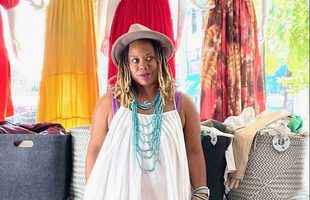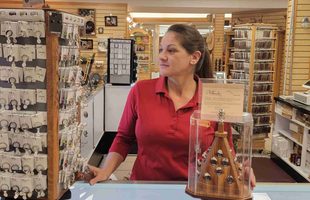By Karen Appold
There’s something extra special about merchandise that will benefit a charity, good cause or workers and craftspeople in developing nations. Customers feel extra good about their purchase. Not only are they buying something that they or a gift recipient will enjoy, but they are helping others, too.
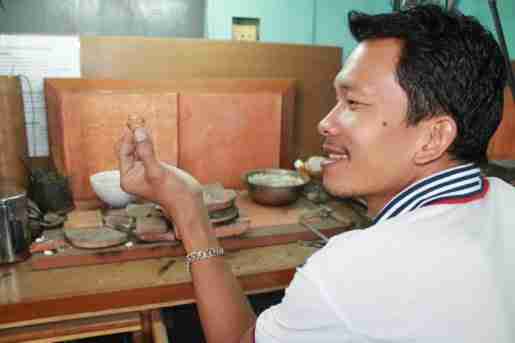 Bombshell jewelry is made by Rajana Crafts of Cambodia and is sold by Ten Thousand Villages. The organization seeks to improve the lives of artisans in 38 countries.
Bombshell jewelry is made by Rajana Crafts of Cambodia and is sold by Ten Thousand Villages. The organization seeks to improve the lives of artisans in 38 countries.One of the world’s largest fair trade organizations, Ten Thousand Villages, strives to improve the livelihood of tens of thousands of disadvantaged artisans in 38 countries in Asia, Africa, Central America, South America, the Caribbean and Middle East. “Ten Thousand Villages accomplishes this by establishing a sustainable market for handmade products in North America, and building long-term buying relationships in places where skilled artisan partners lack opportunities for stable income,” said Juanita Fox, advertising coordinator, Ten Thousand Villages, Akron, Pa. “Product sales help pay for food, education, healthcare and housing for artisans who would otherwise be unemployed or underemployed.”
Within the many artisan groups Ten Thousand Villages works with, there are special stories that appeal to customers and give extra significance to the products. For example, recycled saris are repurposed into throws and pillows by women who work with Sacred Mark, a workshop of the artisan group Prokritee in Bangladesh. The artisans are women who have broken away from the sex trade and now make their living by making soap and handicrafts.
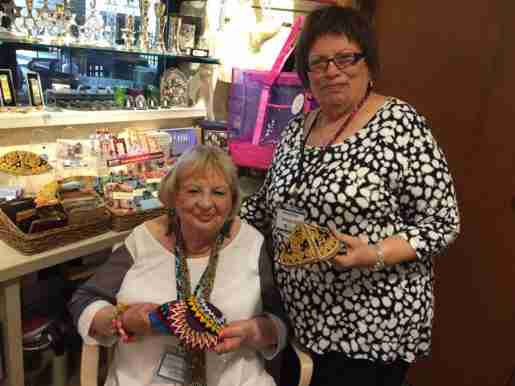 Corrinne Dropkin, left, and Arleen Peltz, of the Jewish Home and Care Center in Milwaukee, Wis. The gift store is run entirely by volunteers, and Peltz does the books and most of the buying, although all of the volunteers get to choose items to order. Peltz and Dropkin are shown holding hand-made yarmulkes that were purchased from Ethiopia and Israel.
Corrinne Dropkin, left, and Arleen Peltz, of the Jewish Home and Care Center in Milwaukee, Wis. The gift store is run entirely by volunteers, and Peltz does the books and most of the buying, although all of the volunteers get to choose items to order. Peltz and Dropkin are shown holding hand-made yarmulkes that were purchased from Ethiopia and Israel.Another example is costume jewelry from artisans working with Bombolulu workshops. Bombolulu provides employment and numerous other benefits, including housing, medical aid and education for adults who are blind or physically disabled and who would otherwise have little chance of employment.
Arleen Peltz, volunteer and buyer, Jewish Home and Care Center Gift Shop, Milwaukee, Wis., said the shop stocks a variety of gift items for all ages. Purses, jewelry, scarves and religious items are selected by first considering residents’ preferences, since in most cases this is the only place they have to shop for family, friends and themselves. All profits are invested within the Foundation of the Jewish Home and Care Center specifically to enhance residents’ lives. “Employees and visitors also shop at the store, but the resident is the first consideration when choosing stock,” she said.
Currently, the shop carries handmade items from Guatemala that support an organization called Maya Works. “Customers are attracted to the quality, variety and workmanship of these products,” said Corrinne Dropkin, a volunteer at Jewish Home and Care Center Gift Shop.
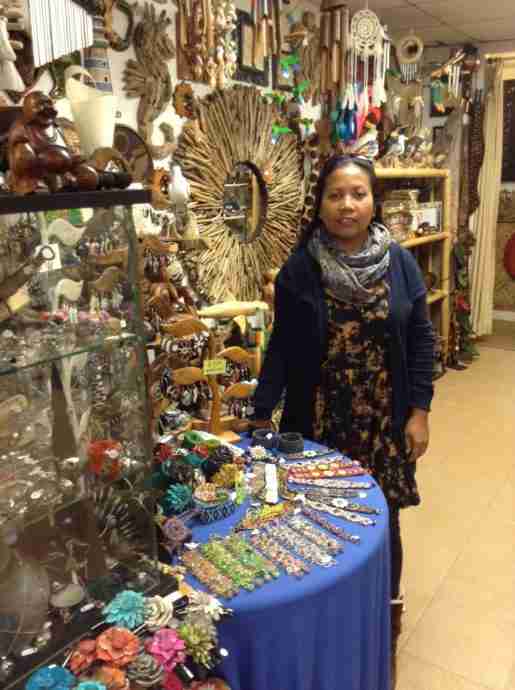 Endang Rahayu-Brangan, owner, Pacific Soul. Batik dresses, traditional musical instruments and hand-woven bags all sell well for the store.
Endang Rahayu-Brangan, owner, Pacific Soul. Batik dresses, traditional musical instruments and hand-woven bags all sell well for the store.Roger Brangan, owner, Pacific Soul, Ocean City, N.J., said his shop sells items that are handmade in Bali, such as wood carvings, mosaics, fabrics, handwoven bags, beaded jewelry, purses and wind chimes. Creating the merchandise is usually a family effort, with husbands carving wooden items and wives and children sanding and finishing them, for instance. Each village and family has their own specialty. “We purchase directly from the craftspeople,” he said.
Batik dresses are among Brangan’s best-sellers. “I think customers are attracted to the bright colors,” he said. Traditional musical instruments also sell well because they are simple, fun and great for all ages. Hand-woven bags made of ata grass (a type of grass that grows specifically in Bali) are also a hit. The store is around 1,000 square feet.
According to Kathy Baxter, administrative resources and retail services manager, Sharp Mary Birch Hospital for Women & Newborns, San Diego, Calif., sales of beaded bracelets from Chavezforcharity.com benefit different charities, including its own hospital’s auxiliary. A tag states that 25 percent of the proceeds will go to the designated charity. Some of the charities include water.org, which works to provide safe water and sanitation to millions of people in Africa, South Asia, and Central and South America; vday.org, an organization aimed at stopping violence against women and girls; and Best Friends Animal Society, dedicated to stopping the killing of healthy and adoptable dogs and cats in America’s shelters.
“People feel good about purchasing something that will benefit a good cause,” Baxter said. However, customers are not apt to buy a product if it is priced too high, even if it benefits an organization. “It must be in a competitive range with my other similar products.”
Baxter has also found that packaging should inform potential buyers that some of the product’s proceeds will benefit charity. “It needs to sell itself on the shelf,” she said. “It needs to appeal to the customer’s emotions and spirit of generosity for charity.”
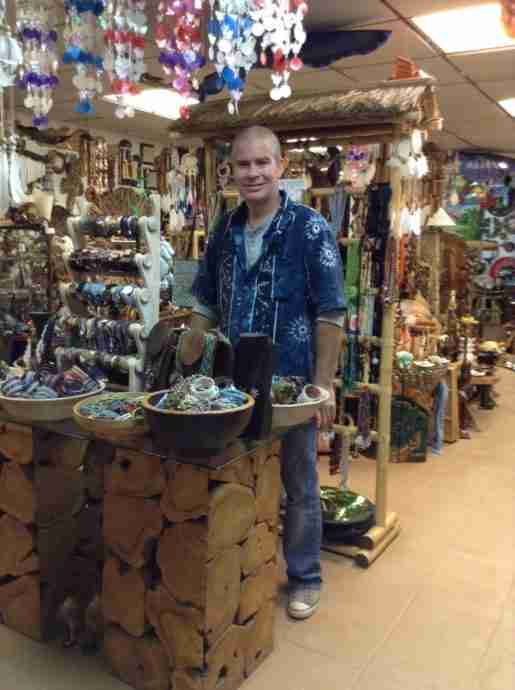 Roger Brangan, owner, Pacific Soul, Ocean City, N.J. Brangan purchases merchandise directly from craftspeople in Bali.
Roger Brangan, owner, Pacific Soul, Ocean City, N.J. Brangan purchases merchandise directly from craftspeople in Bali.Status of Sales
Brangan said sales at Pacific Soul, which is in its seventh season, are up from last year. “Our sales increased after we initially opened, but then leveled off for a few years after Hurricane Sandy; now they are starting to rise again,” he said. “I think this is because a lot more people now know about us; we’re not the new guy anymore.” Furthermore, now that the two store fronts flanking Pacific Soul are occupied, that side of the street is more of a destination for shoppers. More stores in Ocean City overall have also increased the number of shoppers. “The city does a good job of advertising what we have to offer here in Ocean City,” he said. “Gas prices are down, so more people are coming down here from Philly and other areas in Pennsylvania. It’s a mad house on rainy days.”
For Peltz, sales at the 300-square-foot store are seasonal. Seasons are guided by Jewish holidays more than anything. The store sells a lot of merchandise around Chanukah, Passover, and the High Holy Days of Rosh Hashanah and Yom Kippur.
For the last several years, Fox says sales have been flat. “But they have bumped up and down slightly from year to year,” she said.
Baxter also says that sales of products that benefit charities are flat. “Part of it is saturation of the market,” she said. “Eventually everyone who wants that product will have it.” The hospital has four stores, ranging in size from 250 to 1,000 square feet.


